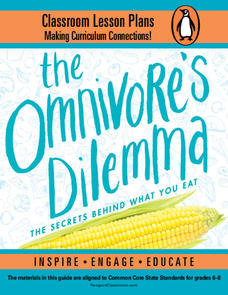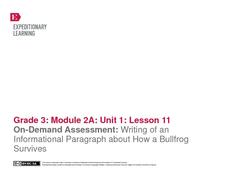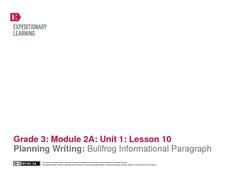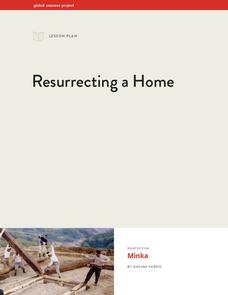Field Museum
The Case of Darwin's Finches
One of the most striking pieces of evidence for Darwin's Evolution of Species was his observations of finches and how their beaks differed from island to island, depending on their primary food sources. So what would happen to the theory...
Penguin Books
The Omnivore’s Dilemma, Young Readers Edition
As the saying goes, you are what you eat. A useful set of lesson plans encourage young readers to take a second look at their eating habits. Pre- and post-reading questions bring in reflective writing and discussion while extension...
Scholastic
Recovery From Drug Addiction
Are there factors that put some individuals at a higher risk for drug addiction than others? Learn more about the risk factors that may make some people more susceptible to addiction, as well as protective factors that help prevent...
EngageNY
On-Demand Assessment: Writing of an Information Paragraph About How a Bullfrog Survives
Having read and discussed Bullfrog at Magnolia Circle, third graders demonstrate their bullfrog expertise by writing informational paragraphs. Building on the note-taking and paragraph planning from the previous lesson plan, learners...
EngageNY
Close Reading of Bullfrog at Magnolia Circle: Main Ideas about the Bullfrog
As your class reaches the end of the book Bullfrog at Magnolia Circle, the seventh lesson in this literary unit helps third graders transition from reading narrative to expository writing. Scholars develop their note-taking skills as...
Project Noah
Writing Goes Wild
Young scientists develop their observation and writing skills as they craft and then post a detailed description of a plant or animal they have spotted and photographed.
EngageNY
Science Talk: How do Bullfrogs Survive
Following the reading of the book Bullfrog at Magnolia Circle, the ninth lesson in this unit involves emerging experts in a science talk about how bullfrogs survive. Looking back through the text, young scholars prepare for the...
EngageNY
Planning Writing: Bullfrog Information Paragraph
Lesson ten in this unit for the book Bullfrogs at Magnolia Circle, prepares third graders to begin writing an informational paragraph about the adaptations of bullfrogs. First, young writers work either independently or in pairs to...
EngageNY
Mid-Unit Assessment: Close Reading of Bullfrog at Magnolia Circle: Bullfrog Life Cycle
The sixth lesson plan in this Bullfrog at Magnolia Circle unit assesses your third graders' ability to read and understand informational text. The included assessment asks learners to take notes about the main idea and supporting details...
Curated OER
Hamlet Research Paper: Find, Evaluate, and Select Appropriate Research Sources
Help young researchers find credible sources online. Modeling with a Google search for information about Shakespeare’s Macbeth, use a computer projector or Smart Board to show class members how weak the top three search results are....
Curated OER
Don't Let the Earth Down
Writing a persuasive argument starts with a clear thesis. Using this resource, your class will write a persuasive paper on a conservation issue. They will then transform their argument into a 30-second public service announcement. If...
Curated OER
Biomes Newsletter Report
If your class will be studying biomes and you also want to address some technology standards, check this out! Each class member becomes an expert on 1 biome through online research, and writes a 4-page report that covers climate,...
Growing Minds
Lettuce Exploration
Kathy Henderson’s book And the Good Brown Earth introduces the class to how a vegetables grows and changes over time. They use different types of lettuce to do a close study of this quick-growing vegetable. Learners consider the look,...
Curated OER
Garden Grid
Basically, your class reads about different garden plants from an included handout and seed packets that you provide, and then uses a grid to plan out where to place the plants. They can practice counting with the seeds, grouping,...
Curated OER
Ever-Changing Art
Students alter art through chemical and physical change. In this ever-changing art lesson plan, students create an original drawing on paper and make copies. Then students induce a chemical and physical change drawing conclusions based...
Curated OER
A Light in the Night
Learners investigate fireflies by reading children books. In this art lesson, students examine the images from the book The Very Lonely Firefly, and discuss the contrast of the artwork. Learners utilize colored pens and glitter to...
EngageNY
TASC Transition Curriculum: Workshop 12
How can opinions slant facts? Workshop participants learn how to examine primary and secondary sources and identify the author's point of view. They also examine how visual art impacts the meaning and rhetoric of sources. Full of...
National Math + Science Initative
Reading an Informational Text: "It All Started with Sputnik"
Sputnik was one of the greatest scientific advancements of the 1950s, and this reading lesson does it justice. Pupils start off with pre-reading questions and a video. They then read an excerpt from an article, which is accompanied by...
Curated OER
Mighty Earth Movers
Note that although the publisher lists almost all of the Common Core standards for both math and language arts, you will most likely want to take the general topic and choose which area to focus on. Regarding math, pupils measure worms...
Global Oneness Project
Resurrecting a Home
Davina Pardo's documentary Minka asks viewers to consider that value of preserving traditional dwellings and traditional building techniques by examining how American journalist John Roderick and Japanese architect Yoshihiro Takishita...
Curated OER
The Art of Simple Machines
Students investigate the inventions of simple machines in our past and how they affect us today. In this engineering lesson, students discover who Rube Goldberg was and his ideas about complicated machines performing very simple tasks....
Agency for Toxic Substances and Disease Registry
Don't Mess with Mercury (Lesson C)
The health effects of mercury exposure if the focus of the first of three activities about the properties of metals. Pairs research mercury to write, prepare, and share posters, articles, or PSAs with the class.
Agency for Toxic Substances and Disease Registry
Don't Mess with Mercury (Lesson A)
Mercury is the only metal that is a liquid at room temperature. Teach your class this and many more interesting mercury facts by assigning an engaging task. A public relations activity, the exercise informs pupils of the hazards of...
Agency for Toxic Substances and Disease Registry
Don't Mess with Mercury (Lesson B)
At one point, people thought mercury was therapeutic for humans, but now we know it is highly toxic. The second of three activities covering mercury focuses on its health hazards if humans are exposed. Pairs research and answer questions...

























